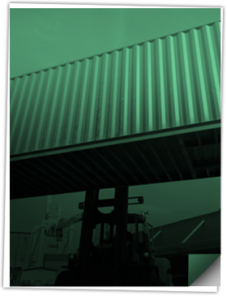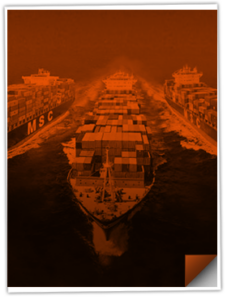Everything You Need to Know About the Vessel Blockage at the Suez Canal
- March 26, 2021
The Ever Given, operated by Evergreen, was headed to the Netherlands on Tuesday when it ran aground, sideways, in the Suez Canal during a dust storm. The Canal is currently blocked in both directions. Dredgers have been working to dislodge the vessel which is blocking the flow of an estimated $12 billion in goods. Some predict that freeing the ship could take weeks.
Here is what you need to know:
- Some shipping companies have already begun seeking alternative routes for their cargo.
- Detouring around Africa is likely to add a week or two to most journeys—and result in millions of dollars in additional fuel costs. There are also heightened risks of piracy to ships being re-routed.
- While only 20% of US-bound cargo capacity from Asia travels through the Suez on the way to the US, an additional 20% returns to Asia via the Suez. Steamship services that use both canals in their design are called pendulum services; they are also nicknamed “round-the-world” services.
- This development adds insult to injury on a global supply chain already stressed by COVID ramifications.
- In the past two months, the Port of Los Angeles has been the cause of slow replenishment of empties due to extreme congestion; the Suez calamity will tremendously amplify the dislocation of empty containers globally.
- While most goods passing the Canal are headed from China to Europe, the ramifications will sooner than later hit the US since we are all connected globally.
Here are the immediate ramifications and considerations:
- Vessels are immediately being diverted, wherever possible. Click HERE to view the list of affected vessels, as of this writing.
- For unsuspended services that rely only on the Panama Canal, demand will immediately increase in a market that is already highly leveraged.
- There will almost certainly be capacity shortages leading to increased freight rates in a market already witnessing record-breaking rates. Air cargo will surge with rates skyrocketing.
- The biggest long-term problem will be a scarcity of empty containers as vessels are two weeks late arriving to North Europe and plentiful stacks of empties there.
- Industry experts expect ocean carriers to declare force majeure so they can recoup millions of dollars of added fuel costs from shippers. Force majeure will also allow carriers to discharge cargo at alternate ports as vessel arrivals are no longer correctly sequenced.
- We expect equipment to remain dislocated for the unforeseeable future, resulting in what will feel like a never-ending peak season.
Here are the most recent developments:
- Carriers that offer many Suez or pendulum services are immediately postponing sailings, rolling cargo, or suspending all services. As an example, today, ONE (K Line, Mitsui, NYK) announced the temporary suspension of ALL Asia bookings. This list of ocean carriers will grow in coming days.
Shapiro will certainly keep you apprised of any new developments. Please reach out to your Shapiro representative with any questions or for any assistance.



